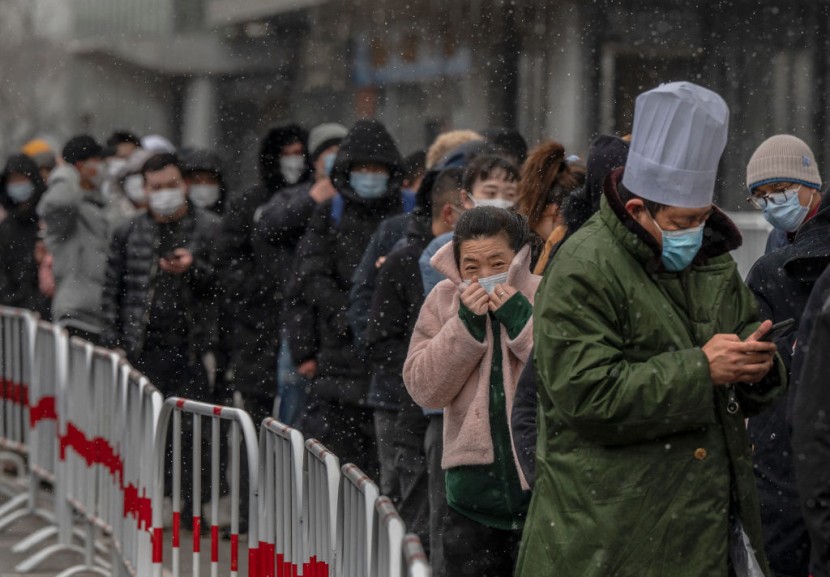
For much of the two years since the worldwide pandemic broke out, China had a more effective campaign against COVID-19, but that has suddenly altered.
While infections in the United States have decreased dramatically in recent weeks, China has seen a huge new COVID-19 outbreak caused by the Omicron strain.
Snowfall has continued into the third week of March, leaving the vacant streets of Changchun, the capital of northeastern Jilin province, gleaming and almost unspoiled by traffic.
With the metropolis of 9 million people facing its most dangerous wave of coronavirus infections since the outbreak began, the city has been under lockdown since Friday, forcing inhabitants to self-quarantine at home. Since Monday, the whole province has been essentially closed off, with all inter-provincial transport prohibited.
New Lockdowns Implemented in China
Even though the residents of Changchun are no strangers to lockdowns, the situation looks to be considerably worse this time. Since Saturday, the whole province of Jilin has been reporting more than 1,000 daily cases, a statistic that no other mainland province has experienced, except Hubei after the coronavirus was originally found in Wuhan.
Though the financial costs of citywide lockdowns are becoming more concerning as the country tries to strike a balance between pandemic control and economic development, some experts say that for resource-strapped regions like the northeastern rust belt, repeated lockdowns may be the best and only option, at least as long as the government sticks to its Zero COVID-19 policy, according to South China Morning Post.
On Wednesday, China's National Health Commission reported 1,226 new domestically transmitted COVID-19 infections with verified symptoms, down from 1,860 the day before. However, China has reported more new local symptomatic cases (nearly 14,000) in the last ten weeks than it did in the entire year of 2021.
Inflation began to rise in China near the end of 2021 and into 2022, but it began to subside in February. With fresh lockdowns in place as a result of the COVID-19 increase, inflation might quickly rise once again. That hasn't prevented some Chinese officials from criticizing the United States for its inflation even though the same officials mocked COVID-19 in the past, Newsweek via MSN reported.
Read Also : COVID-19 Warning: White House Pushes Harder for $22.5 Billion Funding as Experts Predict Coronavirus Surge
Xi Jinping Vows To Reduce Economic Impact of COVID-19 Measures
President Xi Jinping of China has promised to lower the economic burden of his COVID-19 defensive measures, marking a shift in a long-standing approach that has reduced fatalities while putting a strain on the world's second-largest economy.
While he highlighted the need of adhering to the Zero COVID-19 policy, for the time being, his statement lays the ground for Beijing to gradually shift to a less expensive plan to accomplish its lofty development objective this year. Shenzhen, China's technological capital, will allow enterprises and public transportation in five sectors to reopen, while the rest of the city will stay under lockdown.
China will "strive to achieve the maximum prevention and control effect at the least price and minimize the epidemic's impact on economic and social development," Chinese President Xi Jinping said at a meeting of the Communist Party's top decision-making body, the politburo standing committee, late Thursday.
According to a Bloomberg check on the government's website, this is the first time Xi Jinping has stressed limiting the economic burden of COVID-19 prevention at a politburo meeting since the pandemic began in 2020.
In other news, Moderna Inc., filed for U.S. regulatory approval of a second COVID-19 booster dose for all adults, which covers a much larger population than Pfizer Inc., and BioNTech SE's request for a more limited emergency authorization for those over 65 earlier this week. In one week after such test kits were approved in viral prevention procedures, China's local authorities cut down prices of COVID-19 quick antigen test goods by nearly half through centralized procurement, according to Bloomberg via MSN.
Related Article : COVID-19 Cases in South Korea: Over 600,000 Positive Tests, 429 Deaths Recorded Ahead of Removal of Anti-Pandemic Measures
@YouTube








